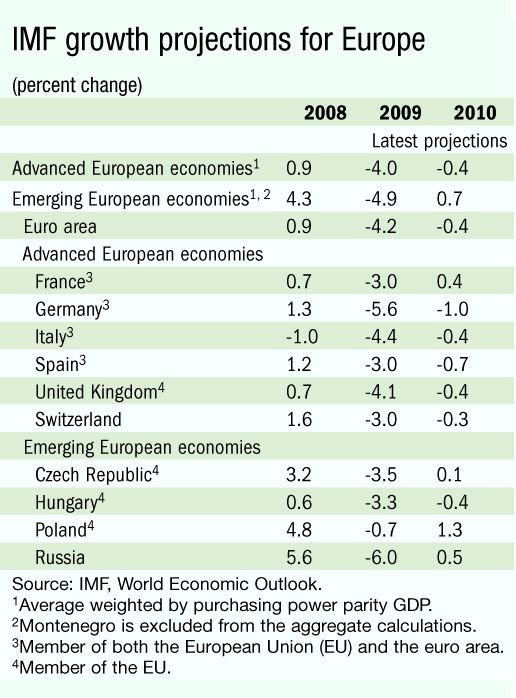
Typical street scene in Santa Ana, El Salvador. (Photo: iStock)
IMF Survey: Europe Battles a Deep Recession
May 12, 2009
- Europe is struggling to overcome deep recession
- More forceful action required in financial sector
- Better policy coordination, more support for emerging economies needed
Following a collapse in confidence and global demand, Europe has entered a deep recession, and there is a risk that it might deepen.

Because of Europe’s strong economic integration, 2008 growth slowed by similar amounts in advanced and emerging economies (photo: Newscom)
REGIONAL ECONOMIC OUTLOOK
The financial crisis is taking a harsh toll on both Europe’s advanced and emerging economies because of the global nature of the shocks that have hit both the financial sector and the real economy, and because of Europe’s strong regional and global trade links.
In advanced Europe, output growth is projected to contract sharply by 4.0 percent in 2009 and decline slightly in 2010. Output in emerging markets is projected to fall by 4.9 percent in 2009, with a modest recovery projected for 2010. Establishing a solid economic recovery will require stronger policy action that is effectively coordinated at the European level, the IMF says in its latest assessment of conditions in the region.
Synchronized recessions
The economic downturn has become a global, synchronized recession. Tighter financial conditions, falling wealth, and greater uncertainty have triggered a sharp decline across all types of demand. This drop in demand has sparked an unprecedented collapse in trade: euro area exports have dropped by an annual rate of 26 percent in the last quarter of 2008. The plunge in demand, together with the reversal of commodity price increases, has pushed headline inflation to very low levels in advanced economies and has diminished concerns about inflation in many emerging economies, the IMF says in its Regional Economic Outlook: Europe.
Because of Europe’s strong economic integration, average growth in 2008 slowed by similar amounts in advanced and emerging economies (see table). There are, however, some notable differences among countries. The Baltic economies, Ireland, Spain, and the United Kingdom have been particularly affected as a result of homegrown real estate booms. Large public debt or current account deficits have created difficulties for other countries (for instance, Greece and Hungary).
Road to recovery may be long
Policymakers have already taken unprecedented action in response to the deepening financial and economic crisis. Central banks, including the European Central Bank, have been providing liquidity support and easing monetary policy, while governments have committed large resources to guarantee, recapitalize and resolve financial institutions. Fiscal policy has been used to shore up demand. Faced with financing difficulties, a number of countries in central and eastern Europe have undertaken adjustment programs supported by financial assistance from the IMF, the European Union (EU), and other bilateral and multilateral sources.

Yet, the report notes, despite the extraordinary nature of the measures taken so far, the financial sector has not returned to normal. The stress in the money market has eased in advanced and some emerging economies, but credit extension is slowing down or falling, and corporate bond spreads remain elevated. Deteriorating economic fundamentals have resulted in rising non-performing loans and tighter lending standards. For emerging economies, access to foreign currency liquidity is a key challenge. All this uncertainty has raised private savings rates, while concerns about fiscal sustainability have pushed up sovereign spreads.
The baseline projection, then, is for a continuing decline in output through the beginning of 2010, followed by a gradual recovery. Economic activity in advanced economies will most likely follow a similar pattern, whereas emerging economies will likely recover at a more uneven pace.
Coordinated policy response
Recessions accompanied by a severe financial crisis and persistent lack of confidence require a comprehensive policy response, consisting of coherent monetary, fiscal, and financial sector policies. In particular, Europe’s high level of economic and financial integration calls for strong coordination of public policies.
In the financial area, building on the actions that have already been taken, more forceful policies are required to restore market confidence, including
• continued provision of liquidity and engagement in credit easing where necessary
• credible loss recognition in the financial system based on stress tests that take into account the expected deterioration in asset quality from the economic downturn
• recapitalization of viable institutions, and orderly resolution of other institutions, and
• ring-fencing of impaired and difficult to value assets.
It will be lot easier to restore market trust if new financial crisis management measures are coordinated before they are put into action.
• For bank recapitalization, agreeing on the common macroeconomic parameters for the stress tests to determine capital needs will avoid distortions, especially for banks that compete internationally.
• Similarly, as impaired assets are widely held, agreeing on the valuation principles in the context of ring-fencing efforts is necessary to ward off inefficient arbitrage and minimize collective costs.
• Dealing with cross-border banks, especially for emerging Europe, requires full coordination between the host country and the country where the bank is headquartered on the principles for loss recognition. Agreement is needed on burden sharing in recapitalization between home and host countries, along the lines of the approach followed by the Nordic-Baltic countries and other similar initiatives. The idea is to establish a forum for home-host coordination of policies and interventions related to financial institutions and involve participants from supervisors, central banks, national authorities, and private cross-border commercial banks, as well as multilateral financial institutions.
• In the context of crisis resolution, adherence to the crisis management principles of the EU’s Economic and Financial Affairs Council (ECOFIN), also by countries that are not members of the EU, would be helpful.
Providing support for the recovery
The report says macroeconomic policies should continue to support demand, while policymakers keep an eye on the medium and longer term. Central banks should use all available room to reduce interest rates. For the EU as a whole, fiscal policy should remain supportive into 2010, but countries’ fiscal policies should take into account the sustainability of public finances.
Financial markets are paying increasing attention to country-specific factors, including debt levels and the budgetary consequences of the financial crisis. This means countries should focus on reversible fiscal measures and on strengthening their fiscal frameworks. Given the increased integration of European economies, policy coordination is key to make the most of national fiscal stimulus packages. Potential problems servicing debt and disruptive exchange rate movements should be preempted through the involvement of EU institutions, and of the IMF where needed.
As the report suggests, an integrated region will profit from coordinated policies. Thus, for Europe, after a period of substantial progress toward integration and convergence, addressing the current economic and financial crisis coherently and comprehensively across advanced and emerging economies provides an opportunity to emerge from the crisis with stronger policy institutions where it is most needed.
Comments on this article should be sent to imfsurvey@imf.org







